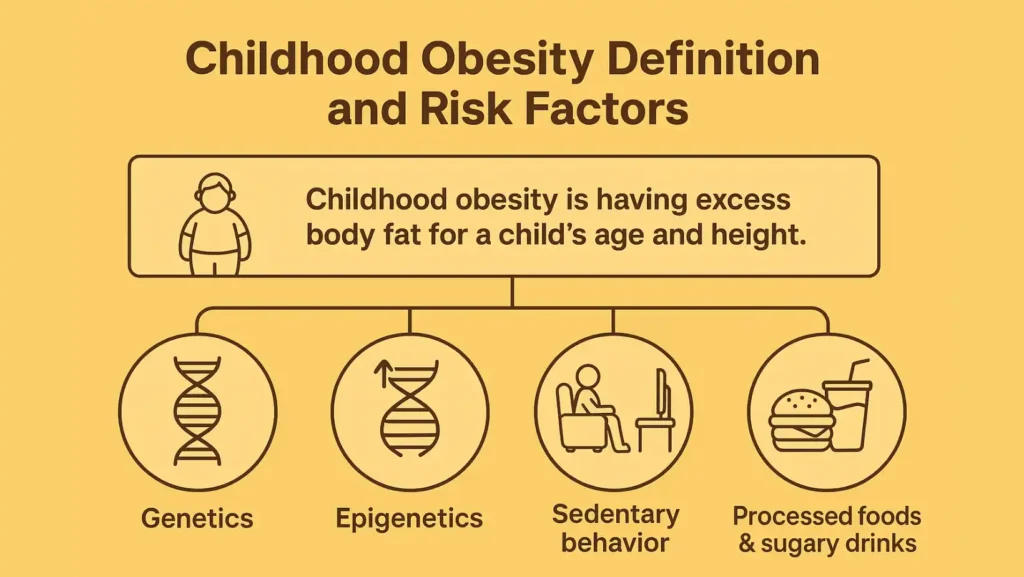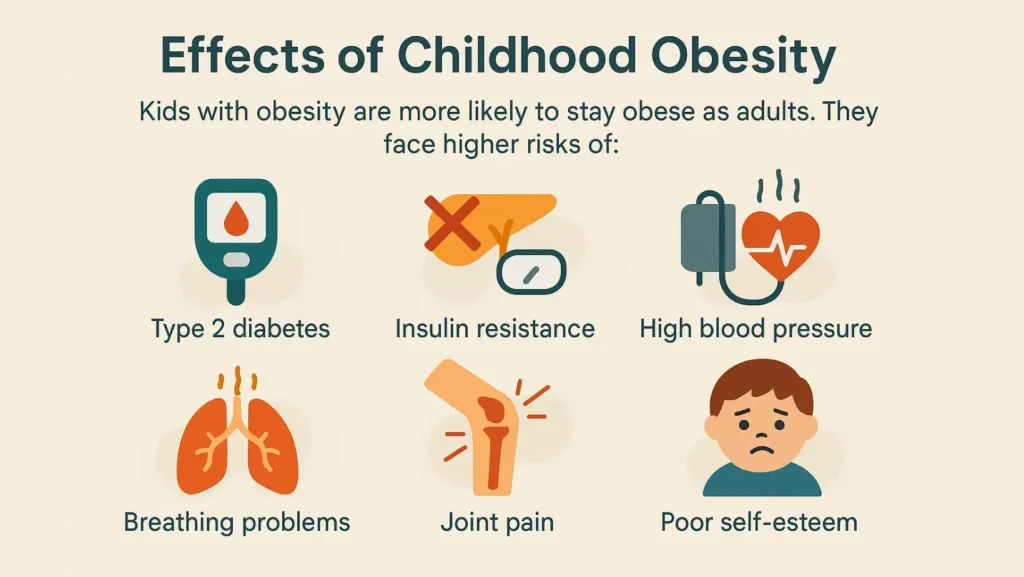Obesity is not just about appearance. It is a serious health concern linked to diabetes, heart disease, joint pain, and even early death. The good news is that prevention works better than treatment. By starting early, choosing healthy food, staying active, and focusing on sleep and stress, obesity can be avoided in both children and adults.
Table of Contents
TogglePreventing Obesity in Childhood
Children form habits early, and those habits can last a lifetime. That is why childhood obesity prevention is one of the most important health goals worldwide.
What Is Childhood Obesity?
Childhood obesity means a child has too much body fat compared to their age and height. Doctors often measure this using BMI (Body Mass Index) growth charts. If the child’s BMI is above the 95th percentile, they are considered obese.
Childhood Obesity Definition And Key Risk Factors

A clear childhood obesity definition shows that it is a long-term medical issue, not just about looks. Obesity in early childhood can happen when a child eats more calories than they burn. Some of the biggest risk factors include:
- Genetics: Family history increases risk.
- Epigenetics: How lifestyle choices affect genes.
- Sedentary behavior / inactivity: Long hours of sitting, watching TV, or scrolling screens.
- Processed foods and fast food: High in sugar, salt, and bad fats.
- Sugary drinks / soft drinks: A single can of soda can pack up to 10 teaspoons of sugar.
Effects Of Childhood Obesity On Long-Term Health

The effects of childhood obesity do not stop in childhood. Kids with obesity are more likely to stay obese as adults. They face higher risks of:
- Type 2 diabetes
- Insulin resistance
- High blood pressure
- Breathing problems
- Joint pain
- Poor self-esteem
A major concern is that overweight kids now show signs of heart disease earlier than before. That is why obesity prevention in kids is urgent.
Childhood Obesity And Diabetes: What Parents Should Know
Childhood obesity and diabetes are closely linked. When a child carries too much fat, the body struggles to use insulin well. This raises blood sugar, which can turn into Type 2 diabetes. Parents must watch for childhood obesity symptoms such as rapid weight gain, dark skin patches (a sign of insulin resistance), and fatigue. Early care prevents serious problems later.
Childhood Obesity Prevention Strategies At Home And School
Strong childhood obesity prevention begins at home. Parents can:
- Serve home-cooked meals.
- Keep snacks like fruits visible.
- Reduce screen time.
- Plan outdoor play.
At school, teachers can support healthy lunches, recess, and physical education. Communities can add safe parks, walking trails, and community obesity prevention programs. Together, these steps shape healthy habits.
Diet To Prevent Obesity
Food choices play the largest role in weight gain. Simple swaps can cut calories, improve nutrition, and keep weight steady.
Eat More Fruits And Vegetables Daily
Eating plenty of fruits & vegetables helps prevent obesity. They are low in calories but high in fiber and water, making kids and adults feel full. Aim for at least five servings a day. Replace chips with carrot sticks or sweet fruit.
Does A Plant-Based Diet Prevent Obesity?
A plant-based diet can support weight control if balanced correctly. It includes whole grains, beans, nuts, vegetables, and fruits. This lowers calorie intake and supports a healthy gut. The Mediterranean diet, which blends vegetables, beans, olive oil, and fish, is another example linked to healthy weight.
Avoid Processed Foods And Fast Foods
Processed foods and fast food are high in salt, sugar, and unhealthy fats. They encourage overeating and change taste preferences. Burgers, fries, and packaged snacks should be occasional treats, not daily meals.
Limit Sugar And Artificial Sweeteners
Cutting out sugary drinks or soft drinks is one of the fastest ways to prevent obesity. Replace soda with water or unsweetened drinks. Avoid artificial sweeteners in kids’ diets, as they may keep sugar cravings strong.
Reduce Saturated Fats And Trans Fats
A healthy diet limits saturated fats and avoids trans fats. Choose lean meats instead of red meat daily. Pick low-fat dairy products and swap fried foods for baked or grilled versions. Use oils rich in healthy fats (monounsaturated/polyunsaturated) like olive or canola oil.
Pay Attention To Beverages: Water Vs. Sugary Drinks
Water is the best drink for everyone. Flavored water with lemon or cucumber can replace soda. Sports drinks and energy drinks should not replace water unless medically needed. Children should never drink soda daily.
Cook At Home For Healthier Eating Habits
Cooking at home builds healthy eating habits. Families can control ingredients, salt, and sugar. It also helps with portion control, a key part of managing calories. Children who cook learn food skills and are more likely to eat vegetables. Home meals make following a balanced diet for obesity prevention easier.
Exercising To Prevent Obesity
Exercise is just as important as diet in controlling weight. Both children and adults benefit from daily movement.
Exercise Recommendations For Adults
Adults should do at least 150 minutes of moderate physical activity / exercise weekly. Add strength training twice a week to build muscle. Activities like walking, cycling, and swimming are excellent. These habits help with weight management tips for the long term.
Exercise To Prevent Obesity In Children
Kids need at least 60 minutes of active play every day. Schools should prioritize gym classes and outdoor play. Parents must encourage sports, dancing, or simple games. Exercise to prevent obesity is fun when the whole family joins.
Fun Physical Activities For The Whole Family
Movement should never feel like a punishment. Families can try:
- Evening walking together.
- Riding bikes.
- Hiking on weekends.
- Dance challenges at home.
- Trying martial arts, skating, or swimming.
Adding fun builds lifelong habits.
Reducing Stress To Prevent Obesity
Stress can push people to eat more and move less. Long-term stress changes hormones that affect fat storage.
How Stress Contributes To Obesity
When stress levels rise, the hormone cortisol rises too. High cortisol increases appetite and fat storage, especially around the belly. Stress also encourages sedentary behavior / inactivity and emotional eating.
Relaxation Techniques And Stress Management
Managing stress prevents weight gain. Families can practice deep breathing, journaling, and listening to music. Gentle movements like yoga / tai chi lower stress and improve flexibility. Teaching kids coping skills early supports lifelong health.
Improving Sleep To Prevent Obesity
Sleep is as important as food and exercise. Poor sleep disrupts hormones, appetite, and activity levels.
How Poor Sleep Affects Weight Gain
Lack of sleep makes the body crave sugar for energy. It lowers willpower, increases hunger, and encourages overeating. Poor sleep is a hidden cause of obesity and weight gain.
Healthy Sleep Habits For Children And Adults
Both kids and adults should follow strong sleep / bedtime routines. Go to bed at the same time every night. Keep bedrooms cool and dark. Reduce screen time before bed. Sleep supports growth, focus, and energy.
The Bottom Line
How to prevent obesity is not a mystery. It means combining small, steady habits. Eat real food. Move daily. Rest well. Manage stress. Involve schools, families, and communities.
When kids learn healthy habits, they carry them into adulthood. Parents should model behaviors, schools should support them, and communities should provide safe spaces. Every effort counts in obesity prevention.
FAQs
What is the best solution to obesity?
The best solution includes healthy food, daily exercise, good sleep, and stress care with medical guidance when needed.
How to prevent obesity in kids?
Encourage outdoor play, limit screens, serve fruits, avoid sugary drinks, and involve the whole family in healthy living.
How to prevent weight gain and obesity?
Watch food portions, stay active, sleep well, drink water, and avoid processed foods.
Why is preventing obesity important?
It lowers the risk of diabetes, heart disease, and joint pain, while also improving mood, focus, and school performance.
Which prevention causes weight gain?
Extreme dieting, skipping meals, or replacing food with sugary drinks may backfire and increase weight gain.
What are the five effects of obesity?
Diabetes, heart disease, breathing problems, joint pain, and poor self-esteem are five common effects of obesity.
What exercises prevent childhood obesity?
Running, sports, cycling, swimming, dance, and family walks are fun, effective exercises that prevent childhood obesity.

This article is medically reviewed by Dr. Chandril Chugh, Board-Certified Neurologist, providing expert insights and reliable health information.
Dr. Chandril Chugh is a U.S.-trained neurologist with over a decade of experience. Known for his compassionate care, he specializes in treating neurological conditions such as migraines, epilepsy, and Parkinson’s disease. Dr. Chugh is highly regarded for his patient-centered approach and dedication to providing personalized care.










